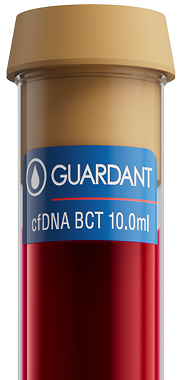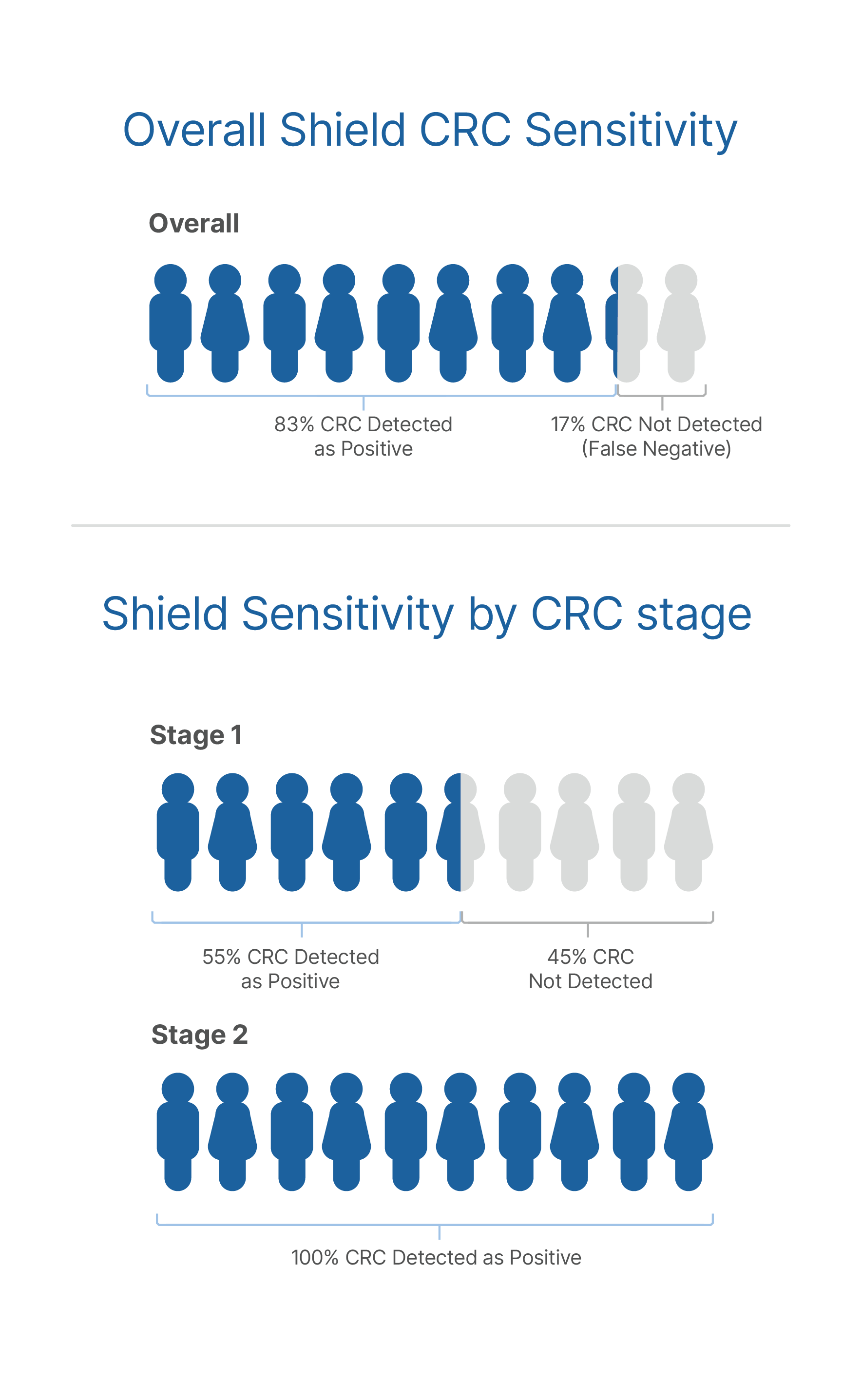
CANCER SCREENING
Let's improve the
stagnant state of
CRC screening
Many patients don’t adhere to traditional modalities, which leads to a high number of preventable deaths. Offer the Shield™ blood test as an option to get more patients screened1-3
Order ShieldCRC is the 2nd-deadliest
cancer in the US4
~50 million
people
remain unscreened5
3 out of 4
people who died of CRC were not up to date with screening6
In a study of 1750 patients who died of CRC between 2006 and 2012
Patients live longer when
CRC is detected early7
5-year relative survival rates based on stage at diagnosis7,8
Localized (I-II)
91%
Distant (IV)
16%
SEER 22 5-year relative survival data for colorectal cancer; obtained from 2014-2020
It is estimated that nearly 70% of CRC-related deaths in 2023 were in patients ≥65 years of age.
~70%
of CRC-related deaths
in 2023 were in patients ≥65 years of age9
Estimate from the American Cancer Society
CRC is highly treatable if detected early,
yet many people remain unscreened9,10

What stands in the way of your patients getting screened for CRC?
Logistical challenges. Lack of urgency. When it comes to traditional screening tests, patients also mention11,12:
Hassle
of unpleasant and extensive preparation
Aversion
to handling stool
Worry
about an invasive procedure
Offer your patients Shield: a more pleasant way to screen
Order ShieldThe challenge to meet the nationwide goal of 80% screening adherence still persists5
That's where the Shield
blood test comes in
*Internal data on file, March 2024. Based on the first 20,000 patients offered Shield. Data from real-world clinical settings. Data based on Laboratory Developed Test (LDT) usage of Shield, which has not been cleared or approved by the FDA
“People know that it’s important to be screened, but there are barriers that prevent them from doing it”
Family Practice
Physician

Ready to offer Shield to your patients?
Start ordering today—or connect with our team to set up your practice.

- References:
- Meester RGS, Doubeni CA, Lansdorp-Vogelaar I, et al. Colorectal cancer deaths attributable to nonuse of screening in the United States. Ann Epidemiol. 2015;25(3):208-213.e1. doi: 10.1016/j.annepidem.2014.11.011
- Coronado GD, Jenkins CL, Shuster E, et al. Blood-based colorectal cancer screening in an integrated health system: a randomised trial of patient adherence. Gut. 2024;73(4):622-628. doi:10.1136/gutjnl-2023-330980
- Data on file. Guardant Health, Inc.
- Siegel RL, Giaquinto AN, Jemal A. Cancer statistics, 2024. CA Cancer J Clin. 2024;74:12-49. doi: 10.3322/caac.21820
- American Cancer Society. Achieving 80% colorectal cancer screening rates in every community. Accessed October 18, 2023. https://nccrt.org/80-in-everycommunity-2/#1686669313593-e93793c6-cbc7
- Doubeni CA, Fedewa SA, Levin TR, et al. Modifiable failures in the colorectal cancer screening process and their association with risk of death. Gastroenterology. 2019;156(1):63-74. doi:10.1053/j.gastro.2018.09.040
- National Cancer Institute. Cancer Stat Facts: Colorectal Cancer. Accessed May 31, 2024. https://seer.cancer.gov/statfacts/html/colorect.html
- National Cancer Institute. Colon Cancer Treatment (PDQ®)–Health Professional Version. Accessed June 2, 2024. https://www.cancer.gov/types/colorectal/hp/colon-treatment-pdq
- American Cancer Society. Colorectal Cancer Facts & Figures 2023-2025. Atlanta: American Cancer Society; 2023.
- Bresalier RS. Early detection of and screening for colorectal neoplasia. Gut Liver. 2009;3(2):69-80. doi: 10.5009/gnl.2009.3.2.69
- Jones RM, Devers KJ, Kuzel AJ, Woolf SH. Patient-reported barriers to colorectal cancer screening: A mixed-methods analysis. Am J Prev Med. 2009:38(5):508-516. doi:10.1016/j.amepre.2010.01.021
- Muthukrishan M, Arnold LD, Aimee SJ. Patients’ self-reported barriers to colon cancer screening in federally qualified health center settings. Prev Med Rep. 2019 May 15;15:100896. doi:10.1016/j.pmedr.2019.100896
- Bretthauer M, Løberg M, Wieszczy P, et al. NordICC Study Group. Effect of colonoscopy screening on risks of colorectal cancer and related death. N Engl J Med. 2022;387(17):1547-1556. doi: 10.1056/NEJMoa2208375
- Lin JS, Perdue LA, Henrikson NB, Bean SI, Blasi PR. Screening for Colorectal Cancer: An Evidence Update for the U.S. Preventive Services Task Force. Evidence Synthesis No. 202. AHRQ Publication No. 20-05271-EF-1. Rockville, MD: Agency for Healthcare Research and Quality; 2021.
- Quintero E, Castells A, Bujanda L. Colonoscopy versus fecal immunochemical testing in colorectal-cancer screening. N Engl J Med. 2012;366(8):697-706. doi: 10.1056/NEJMoa1108895
- Jensen CD, Corley DA, Quinn VP, et al. Fecal immunochemical test program performance over 4 rounds of annual screening. Ann Intern Med. 2016;164(7):456-463. doi: 10.7326/M15-0983
- Oluloro A, Petrik AF, Turner A, et al. Timeliness of colonoscopy after abnormal fecal test results in a safety net practice. J Community Health. 2016;41(4):864-870. doi: 10.1007/s10900-016-0165-y.
- Binefa G, Garcia M, Milà N, et al. Colorectal cancer screening programme in Spain: Results of key performance indicators after five rounds (2000-2012). Sci Rep. 2016;6:19532. doi: 10.1038/srep19532
- Idigoras I, Arrospide A, Portillo I, et al. Evaluation of the colorectal cancer screening programme in the Basque Country (Spain) and its effectiveness based on the Miscan-colon model. BMC Public Health. 2017;18(1):78. doi: 10.1186/s12889-017-4639-3
- Bretagne JF, Piette C, Cosson M, Durand G, Lièvre A. Switching from guaiac to immunochemical faecal occult blood test increases participation and diagnostic yield of colorectal cancer screening. Dig Liver Dis. 2019;51(10):1461-1469. doi: 10.1016/j.dld.2019.05.004
- Akram A, Juang D, Bustamante R, et al. Replacing the guaiac fecal occult blood test with the fecal immunochemical test increases proportion of individuals screened in a large healthcare setting. Clin Gastroenterol Hepatol. 2017;15(8):1265-1270.e1. doi: 10.1016/j.cgh.2017.01.025
- Singal AG, Gupta S, Sugg Skinner C, et al. Effect of colonoscopy outreach vs fecal immunochemical test outreach on colorectal cancer screening completion: a randomized clinical trial. JAMA. 2017;318(9):806-815. doi: 10.1001/jama.2017.11389
- Nielson CM, Vollmer WM, Petrik AF, Keast EM, Green BB, Coronado GD. Factors affecting adherence in a pragmatic trial of annual fecal immunochemical testing for colorectal cancer. J Gen Intern Med. 2019;34(6):978-985. doi: 10.1007/s11606-018-4820-0
- Forsberg A, Westerberg M, Metcalfe C, et al. SCREESCO Investigators. Once-only colonoscopy or two rounds of faecal immunochemical testing 2 years apart for colorectal cancer screening (SCREESCO): Preliminary report of a randomised controlled trial. Lancet Gastroenterol Hepatol. 2022;7(6):513-521. doi: 10.1016/S2468-1253(21)00473-8
- Conroy K. Exact Sciences. 36th Annual JP Morgan Healthcare Conference; 9 January 2018; San Francisco, California 2018.
- Weiser E, Parks PD, Swartz RK, et al. Cross-sectional adherence with the multi-target stool DNA test for colorectal cancer screening: Real-world data from a large cohort of older adults. J Med Screen. 2021;28(1):18-24. doi:10.1177/0969141320903756
- Miller-Wilson L, Finney Rutten LJ, Van Thomme J, Ozbay B, Limburg PJ. Cross-sectional adherence with the multitarget stool DNA test for colorectal cancer screening in a large, national study of insured patients. Abstract presented at: 2021 Gastrointestinal Cancers Symposium; January 22, 2021.
- Inadomi JM, Vijan S, Janz NK, et al. Adherence to colorectal cancer screening: a randomized clinical trial of competing strategies. Arch Intern Med. 2012;172(7):575-582. doi: 10.1001/archinternmed.2012.332
